
Emotional Changes After a TBI InfoComic
Sometimes, it can be hard for people with TBI to control their feelings. This comic talks about changes in mood or feelings that may happen after a traumatic brain injury and how to find support.
Download your own copy in English | in Spanish
Vea hoja informativa gráfica en español
Source: Model Systems Knowledge Translation Center Emotional Changes After TBI InfoComic
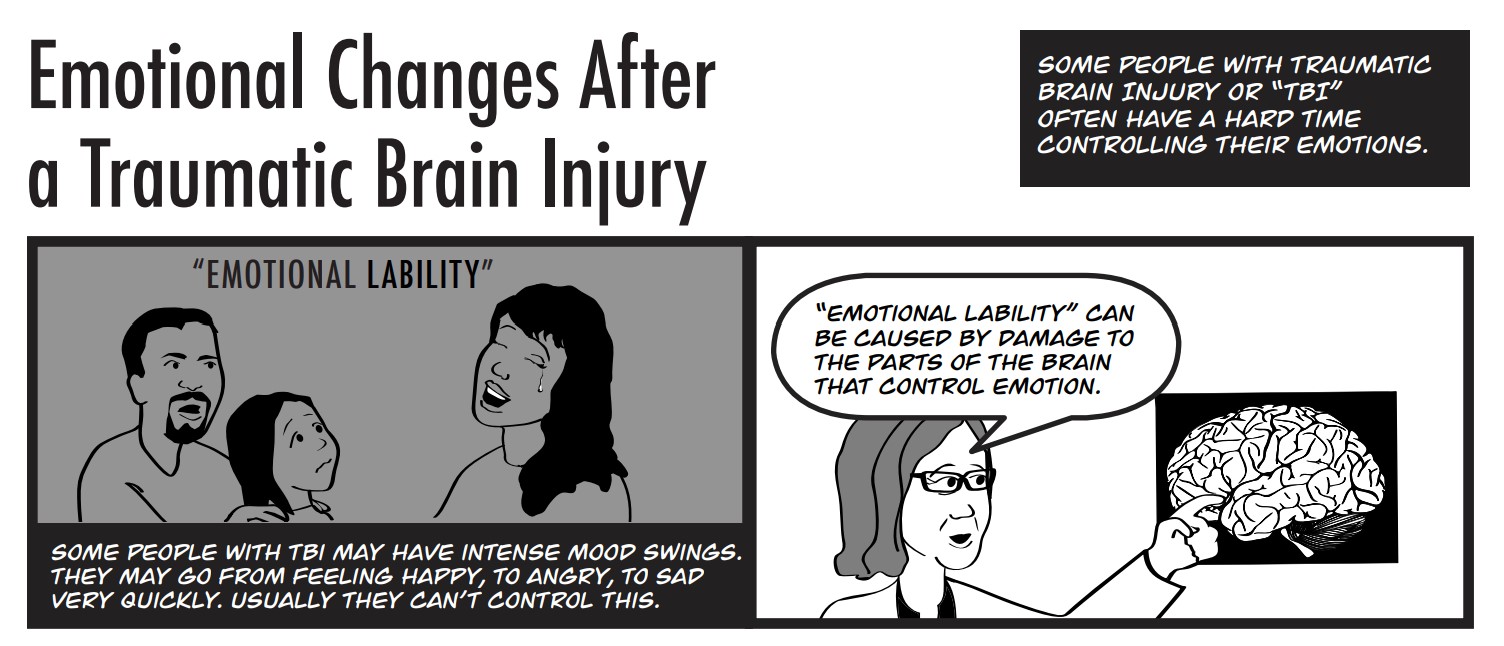
Emotional Changes After a Traumatic Brain Injury
Some people with Traumatic Brain Injury or “TBI” often have a hard time controlling their emotions.
Some people with TBI may have intense mood swings. They may go from feeling happy, to angry, to sad very quickly. Usually they can’t control this.
Doctor: "Emotional lability" can be caused by damage to the parts of the brain that control emotion
Source: Model Systems Knowledge Translation Center Emotional Changes After TBI InfoComic
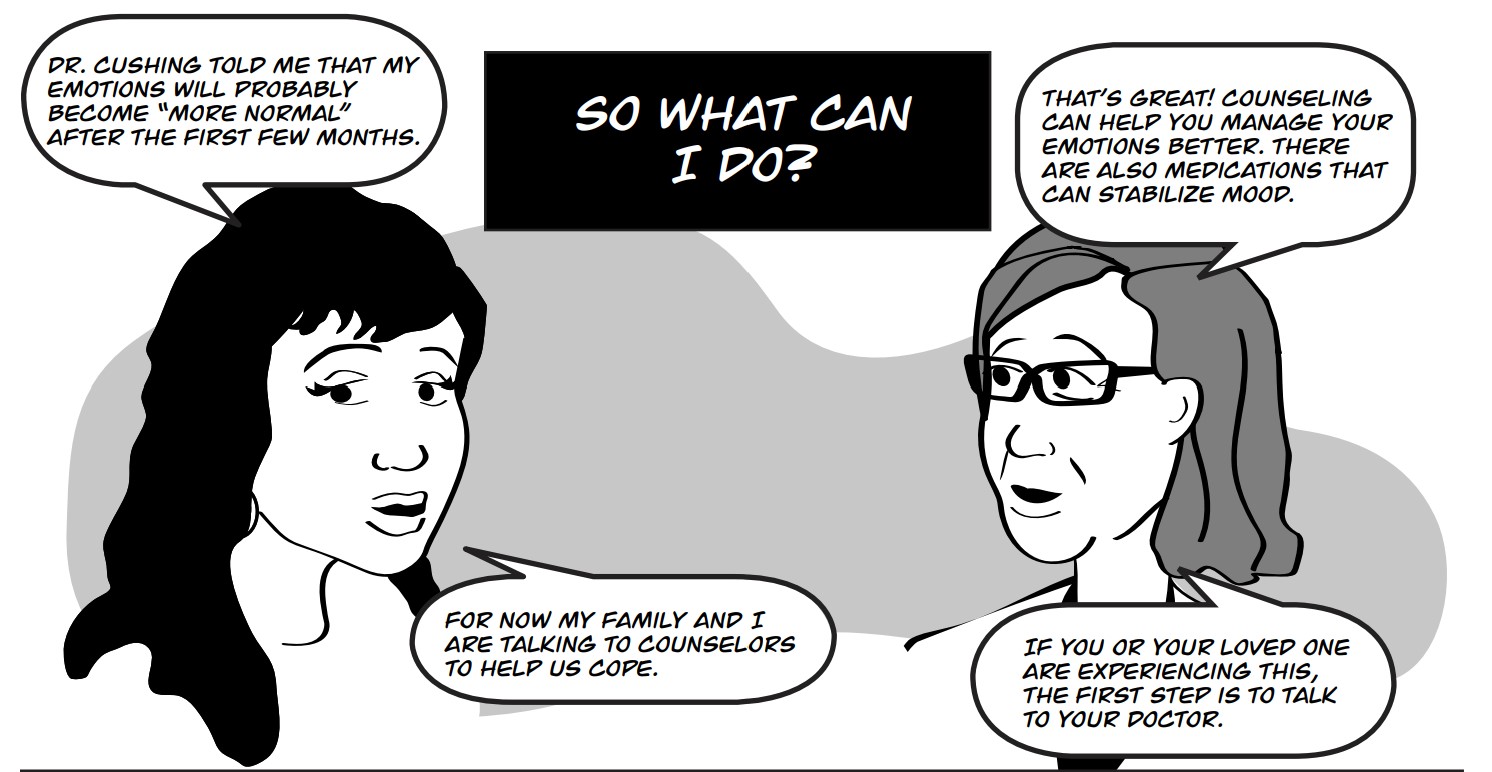
So What Can I Do?
Person with brain injury: Dr. Cushing told me that my emotions will probably become “more normal” after the first few months. For now my family and I are talking to counselors to help us cope.
Doctor: That’s great! Counseling can help you manage your emotions better. There are also medications that can stabilize mood. If you or your loved one are experiencing this, the first step is to talk to your doctor.
Source: Model Systems Knowledge Translation Center Emotional Changes After TBI InfoComic

How Can Your Family Help?
Great question! Here’s a list of a few things you can do to help...
- Remain calm. Avoid reacting emotionally.
- Gently change the subject or suggest doing something else.
- Get them to a quiet area. This will help them regain control.
- Give the person a chance to talk calmly.
- Acknowledge their feelings.
- Provide feedback gently and supportively after they regain control.
Source: Model Systems Knowledge Translation Center Emotional Changes After TBI InfoComic
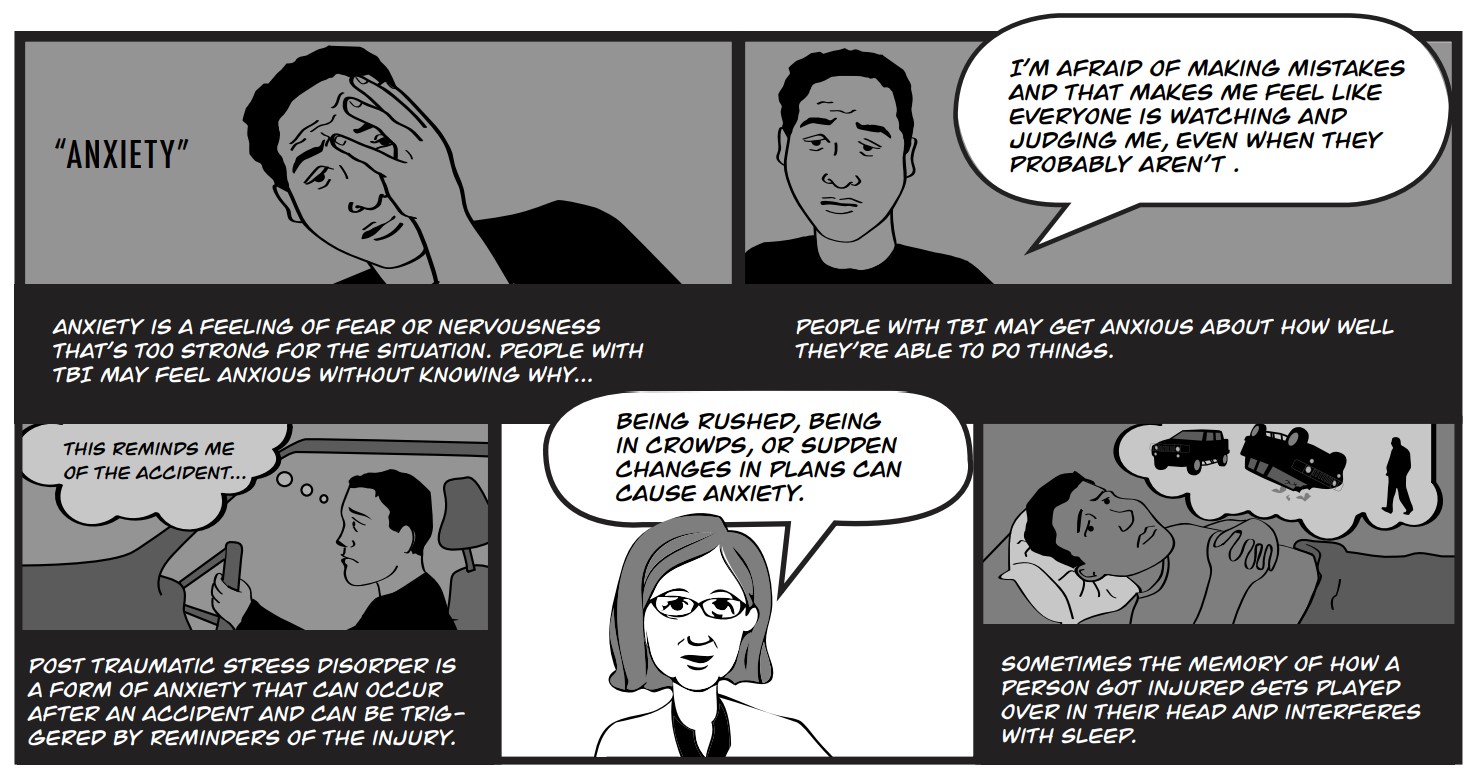
Anxiety
Anxiety is a feeling of fear or nervousness that’s too strong for the situation. People with TBI may feel anxious without knowing why... People with TBI may get anxious about how well they’re able to do things.
Person with brain injury: I’m afraid of making mistakes and that makes me feel like everyone is watching and judging me, even when they probably aren’t.
Person with brain injury, thought bubble: This reminds me of the accident...
Post-traumatic stress disorder is a form of anxiety that can occur after an accident and can be triggered by reminders of the injury.
Doctor: Being rushed, being in crowds, or sudden changes in plans can cause anxiety.
Sometimes the memory of how a person got injured gets played over in their head and interferes with sleep.
Source: Model Systems Knowledge Translation Center Emotional Changes After TBI InfoComic
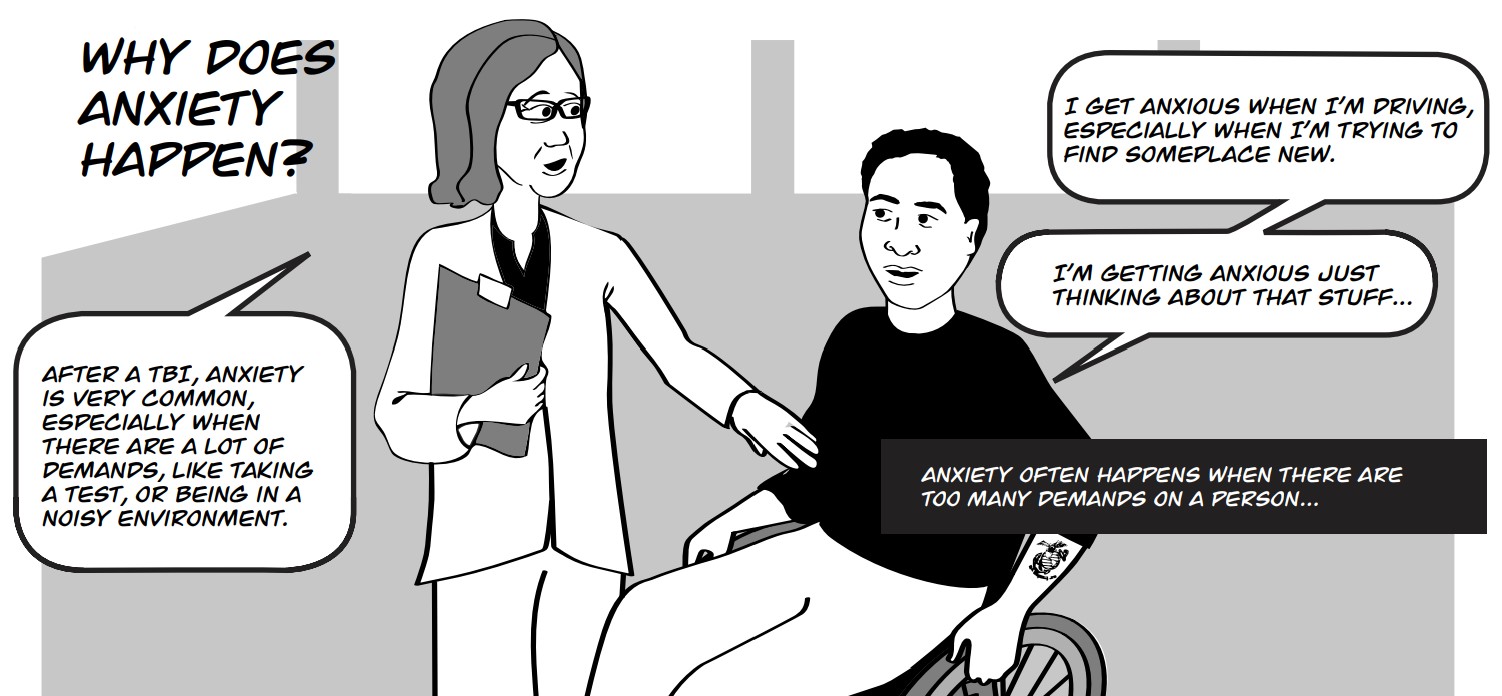
Why Does Anxiety Happen?
Doctor: After a TBI, anxiety is very common, especially when there are a lot of demands, like taking a test, or being in a noisy environment.
Person with anxiety: I get anxious when I’m driving, especially when I’m trying to find someplace new. I’m getting anxious just thinking about that stuff...
Anxiety often happens when there are too many demands on a person.

So What Can I Do About Anxiety?
Try to reduce environmental stresses that cause anxiety. Add structure or routine to daily activities.
Doctor: Counseling is good for managing anxiety, there are also medications that can help. Discuss these options with your doctor.
Source: Model Systems Knowledge Translation Center Emotional Changes After TBI InfoComic
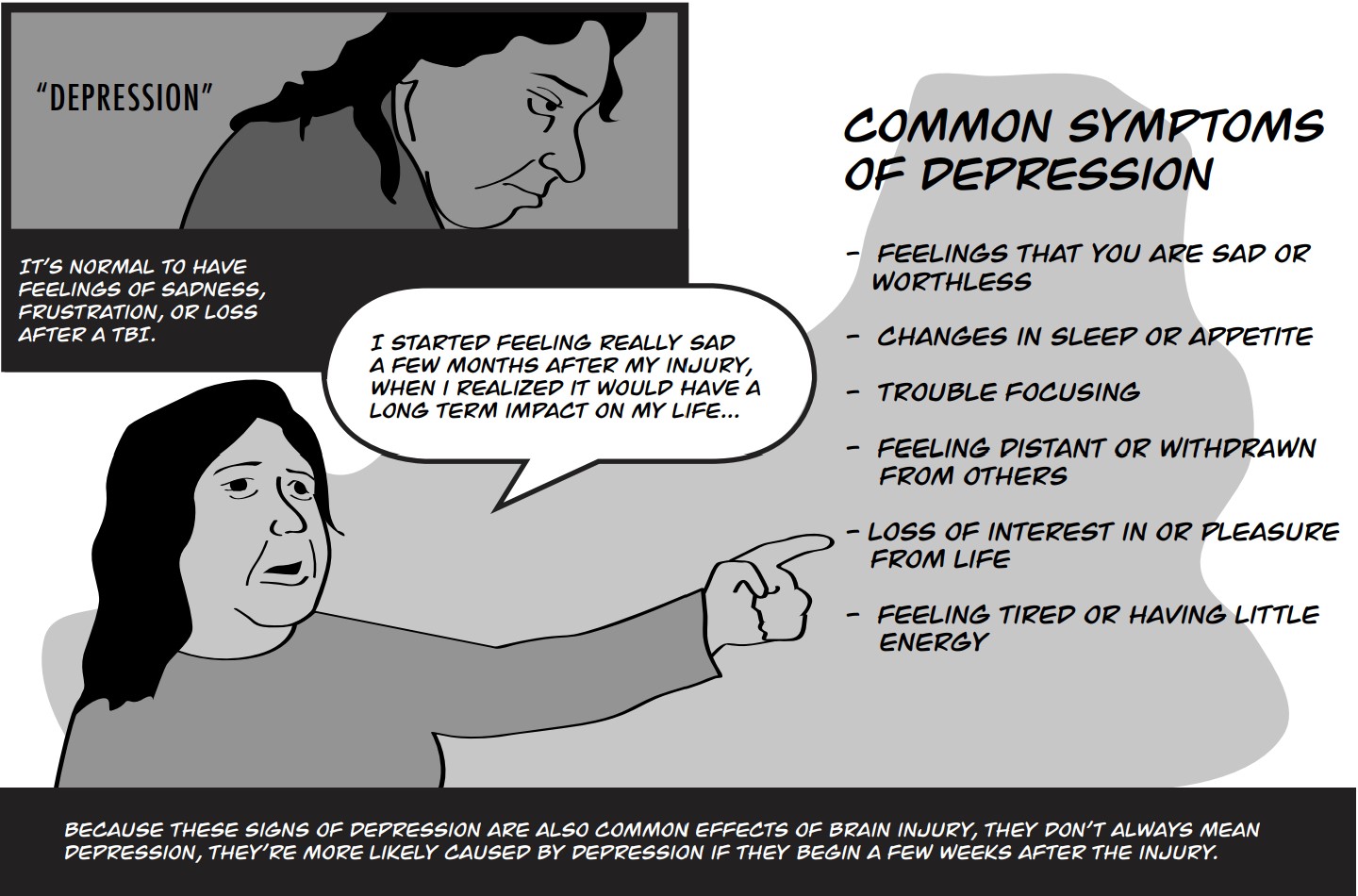
Depression
It’s normal to have feelings of sadness, frustration, or loss after a TBI.
Common Symptoms of Depression:
- Feelings that you are sad or worthless
- Changes in sleep or appetite
- Trouble focusing
- Feeling distant or withdrawn from others
- Loss of interest in or pleasure from life
- Feeling tired or having little energy
Person with brain injury: I started feeling really sad a few months after my injury when I realized it would have a long-term impact on my life...
Because these signs of depression are also common effects of brain injury, they don’t always mean depression, they’re more likely caused by depression if they begin a few weeks after the injury.
Source: Model Systems Knowledge Translation Center Emotional Changes After TBI InfoComic

What Causes Depression After a TBI?
Depression can arise as someone struggles to adjust to a temporary or lasting disability.
Person with brain injury: Ahh, C'mon.
People may become depressed when adjusting to their new role in their family or community.
Depression can also be caused by chemical changes or damage to parts of the brain that control emotions.

What Can Be Done About Depression?
Doctor: Depression is not a sign of weakness. You can’t just “get over it”. Depression is an illness.
Person with brain injury: Aerobic exercise and daily routines helped me reduce my depression.
Doctor: Either counseling, medication, or a combination of both can help some people with depression.
It’s best to take action as soon as possible. If you or someone you love has these symptoms, talk to your Doctor. Don’t wait!
Source: Model Systems Knowledge Translation Center Emotional Changes After TBI InfoComic

"Temper Outbursts and Irritability"
Person with brain injury: Ahhh! I just get irritated so easily!!!
Studies show that 71% of people with TBI are frequently irritable.
Doctor: Family members or individuals with TBI often describe having a “short fuse” or a quick temper.
Source: Model Systems Knowledge Translation Center Emotional Changes After TBI InfoComic
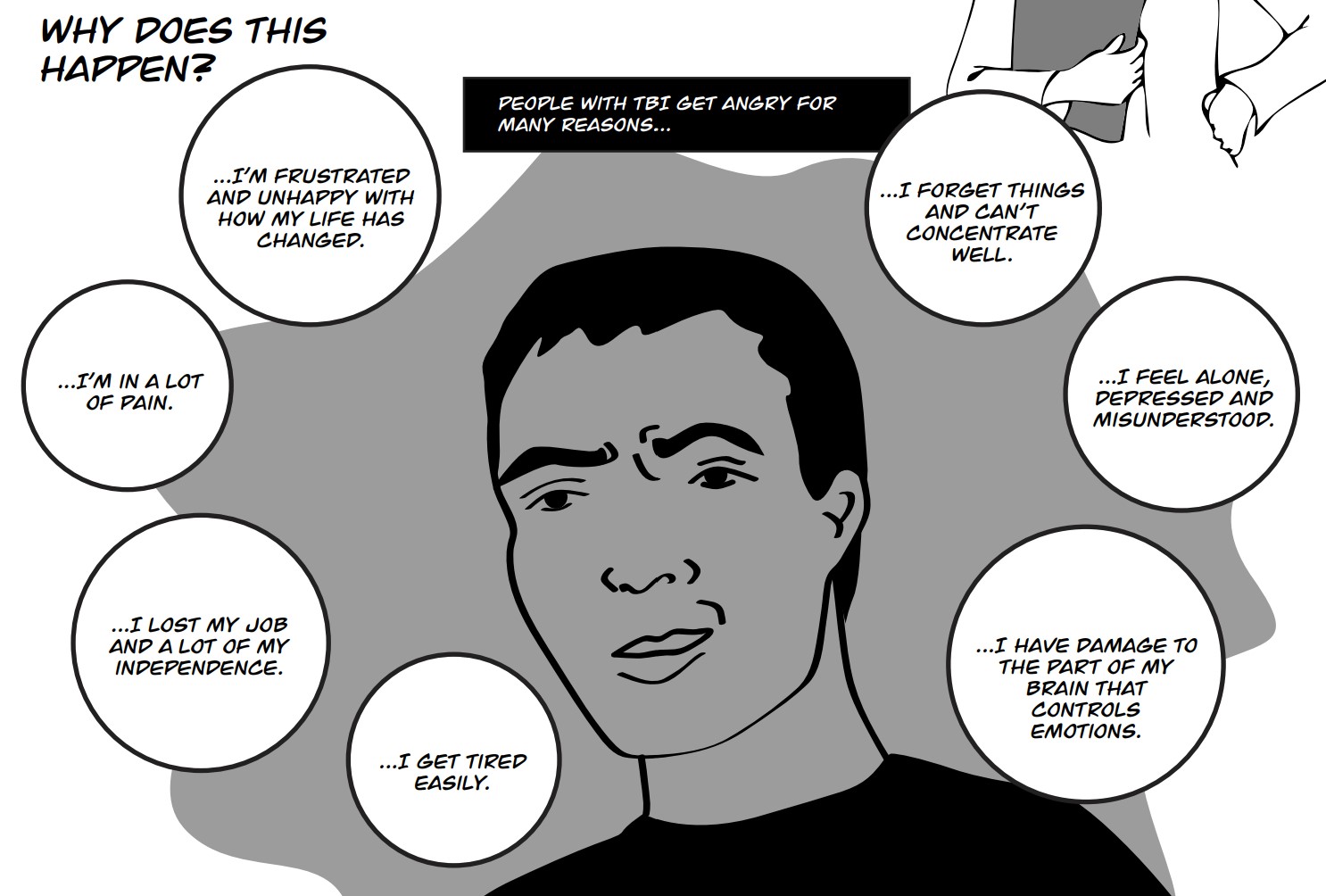
Why Does This Happen?
People with TBI get angry for many reasons.
Person with brain injury:
- I’m frustrated and unhappy with how my life has changed.
- I forget things and can’t concentrate well.
- I’m in a lot of pain.
- I feel alone, depressed, and misunderstood.
- I lost my job and a lot of my independence.
- I get tired easily.
- I have damage to the part of my brain that controls emotions.
Source: Model Systems Knowledge Translation Center Emotional Changes After TBI InfoComic

What Can I Do About My Temper and Irritability?
Reduce stress and decrease irritating situations.
People with TBI can learn some basic anger management skills like self-calming, relaxation techniques, and better communication.
Source: Model Systems Knowledge Translation Center Emotional Changes After TBI InfoComic
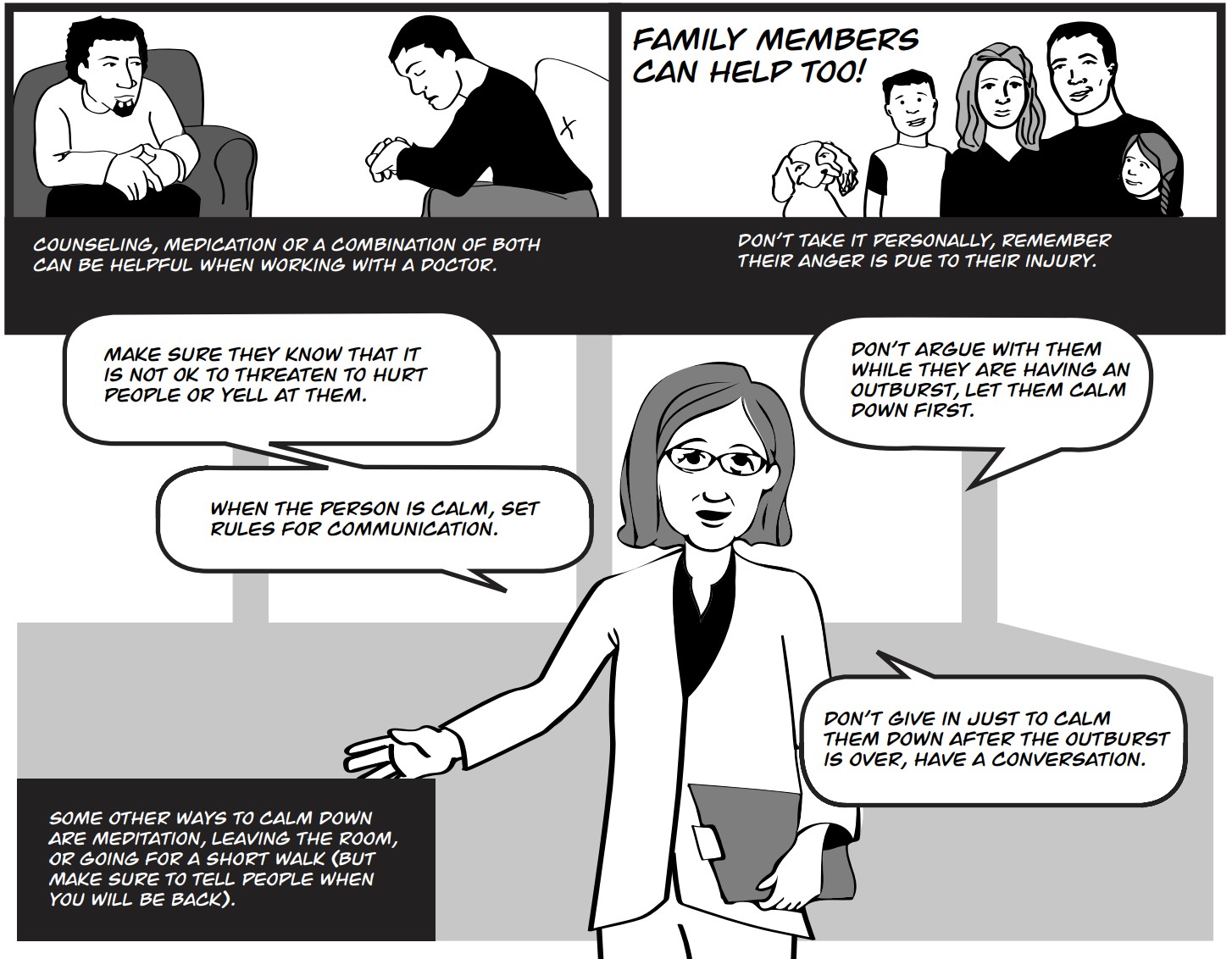
What Can I Do About My Temper and Irritability? (cont.)
Counseling, medication, or a combination of both can be helpful when working with a doctor.
Family Members Can Help Too!
Don’t take it personally, remember their anger is due to their injury.
Source: Model Systems Knowledge Translation Center Emotional Changes After TBI InfoComic
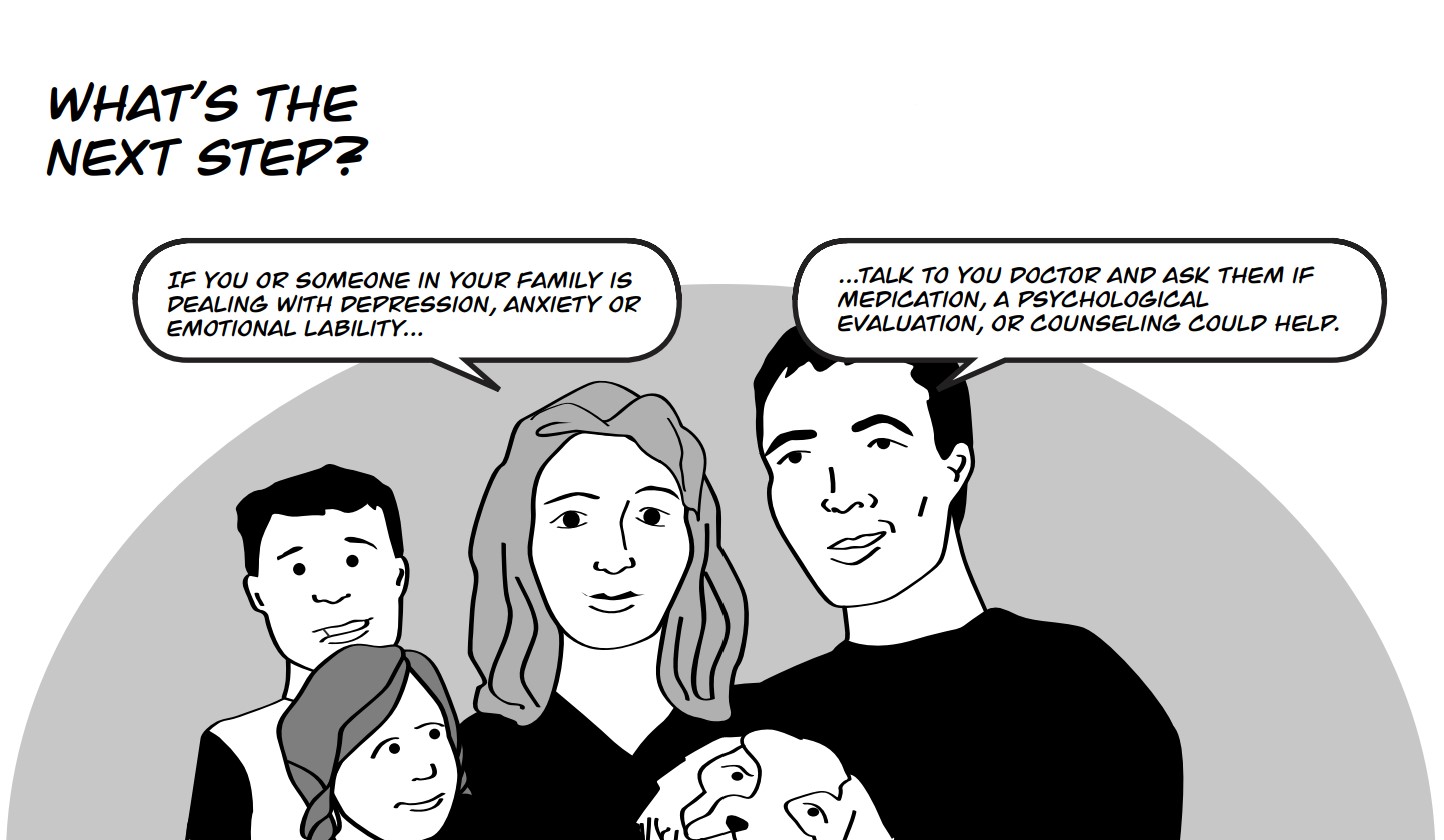
What's the Next Step?
Family member: If you or someone in your family is dealing with depression, anxiety, or emotional lability...
Person with brain injury: ...Talk to your Doctor and ask them if medication, a psychological evaluation, or counseling could help.
Source: Model Systems Knowledge Translation Center Emotional Changes After TBI InfoComic

More about Medications
If you or your family member are taking medications for any of these problems it’s important to work closely with your doctor and be sure to keep your follow-up appointments.
Doctor: It may take some time to see results. Be patient.
There can be a delay before the medication starts working.
Your dose may need to be adjusted by your doctor or you may need to try different medications before you find the one that works best. Except in an emergency, do not stop taking the medication your doctor has prescribed without talking to them first.
Source: Model Systems Knowledge Translation Center Emotional Changes After TBI InfoComic
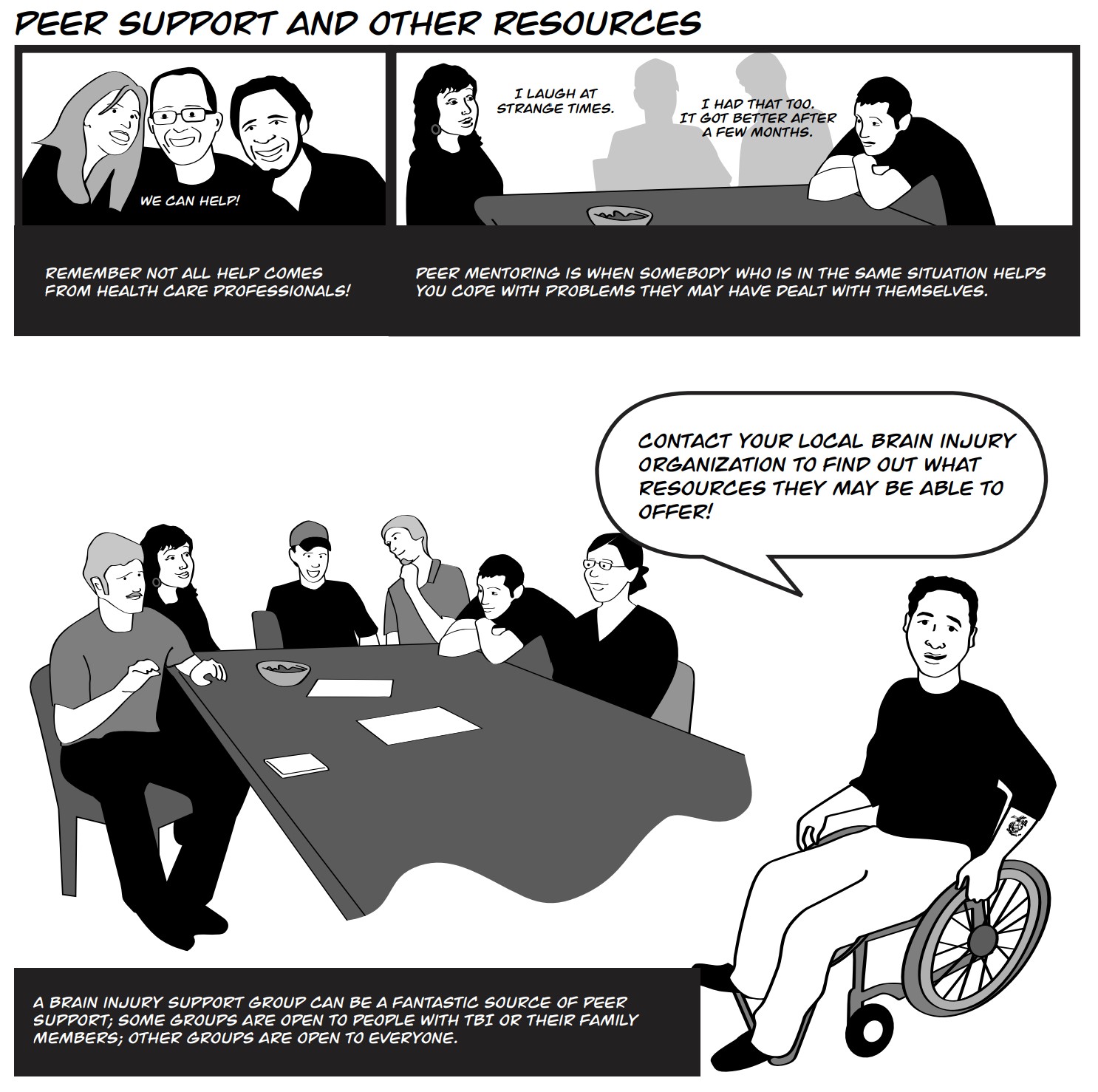
Peer Support and Other resources
Peers: We can help!
Remember not all help comes from health care professionals!
Person with brain injury, left: I laugh at strange times
Person with brain injury, right: I had that too. It got better after a few months.
Peer mentoring is when somebody who is in the same situation helps you cope with problems they may have dealt with themselves.
Person in a wheelchair: Contact your local brain injury organization to find out what resources they may be able to offer!
A brain injury support group can be a fantastic source of peer support; some groups are open to people with TBI or their family members; other groups are open to everyone.
Source: Model Systems Knowledge Translation Center Emotional Changes After TBI InfoComic
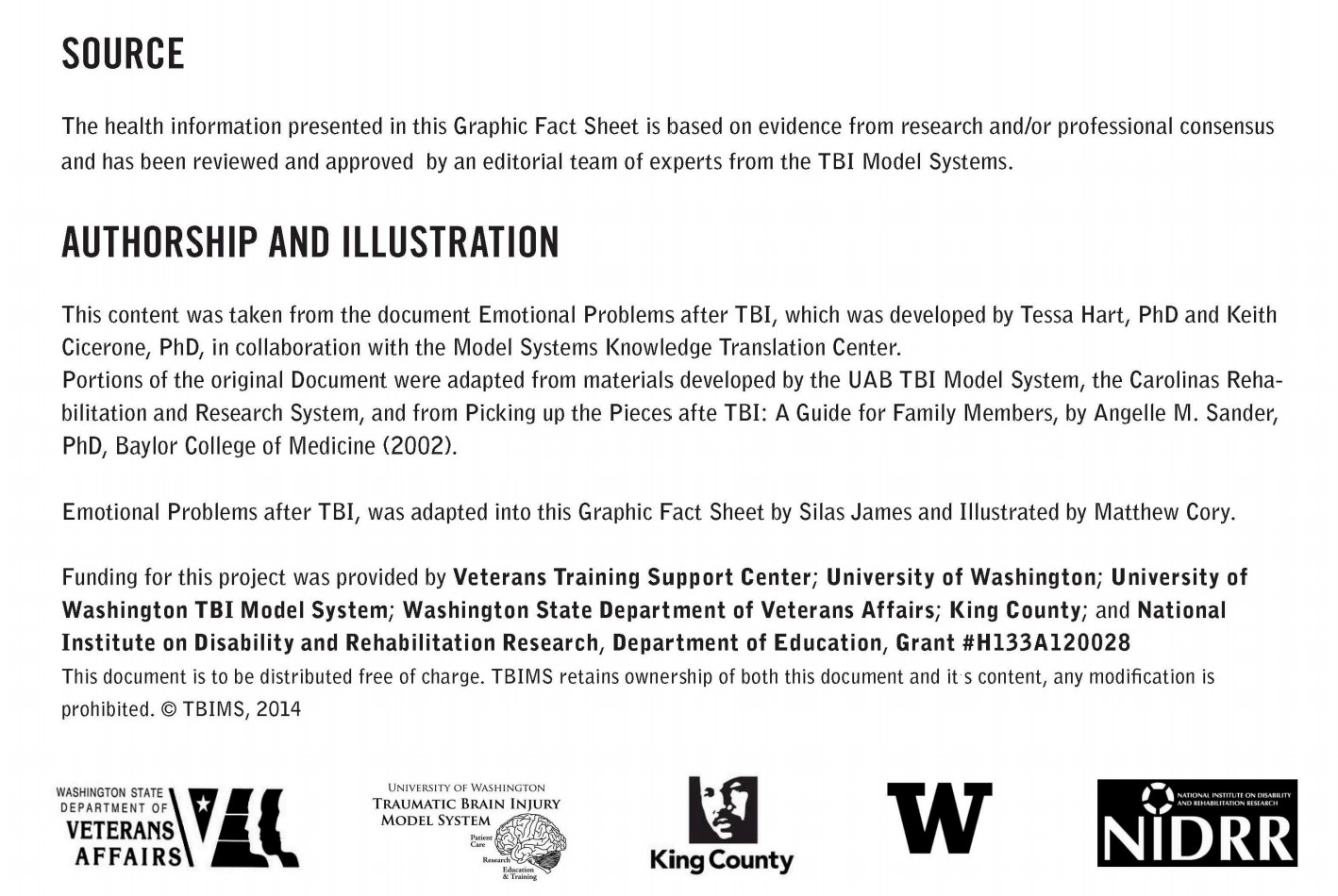
Source
The health information presented in the Graphic Fact Sheet is based on evidence from research and/or professional consensus and has been reviewed and approved by an editorial team of experts from the TBI Model Systems.
Authorship and Illustration
This content was taken from the document Emotional Problems after TBI, which was developed by Tessa Hart, Ph.D. and Keith Cicerone, Ph.D., in collaboration with the Model Systems Knowledge Translation Center.
Portions of the original document were adapted from materials developed by the UAB TBI Model System, the Carolinas Rehabilitation and Research System, and from Picking up the Pieces after TBI: A Guide for Family Members, by Angelle M. Sander, Ph.D., Baylor College of Medicine (2002).
Emotional Problems after TBI was adapted into this Graphic Fact Sheet by Silas James and Illustrated by Matthew Cory.
Funding for this project was provided by Veterans Training Support Center; University of Washington; University of Washington TBI Model System; Washington State Department of Veterans Affairs; King County; and National Institute on Disability and Rehabilitation Research, Department of Education, Grant #H133A120028.
Source: Model Systems Knowledge Translation Center Emotional Changes After TBI InfoComic
